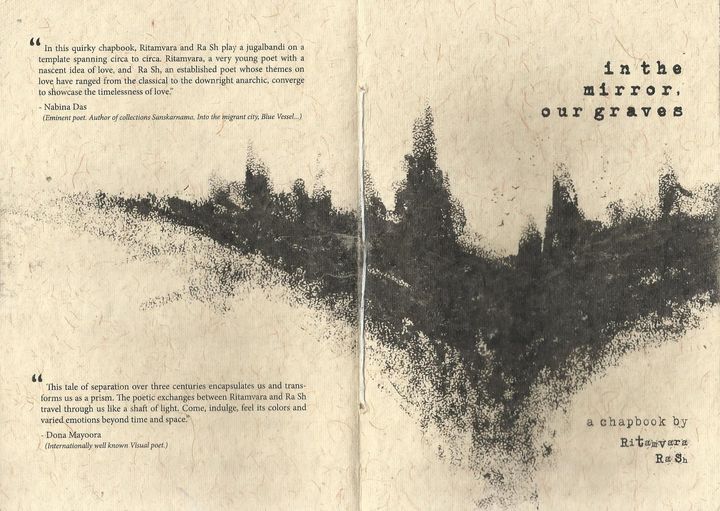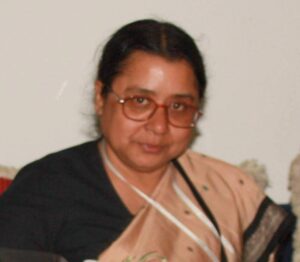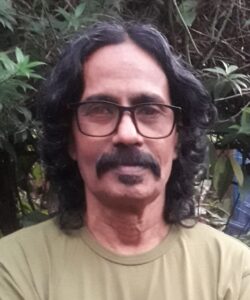Book Review By – Soma Roy
A series of poems exchanged between two poets who have never met and are separated by vast expanses of time and space. Love is fluid matter that runs through them without crystallization.

This delicate little book of poems In The Mirror, Our Graves by Ritamvara and Ra Sh is crafted for intimate reading and reflection. The book interlaces images and texts. The intriguing charcoal sketches and ink blots give the whole presentation a sophisticated yet rustic touch.
The poems in this book form an enchanting and dreamy collection that take its readers into a different world of permanence and impermanence, and leave them fascinated with its timelessness and sensitivity, as in these lines-
I carry rain in my eyes to walk
the Paradise on a moonlit night
and,
We know we were and
we will be
Each poem pulls us in with its charm and undertones of love. As aptly stated by the acclaimed visual poet Dona Mayoora in the blurb – ‘this tale of separation over three centuries encapsulates us…’
I looked for your smell and found it
hiding under the pillow.
I dragged it out. I kissed the scent
throughout the night.
………I learned that the heart does not stop
even when left alone. Silently it lives on
waiting for your delicate touch again.
The poems are full of sound-words like clinking bangles, heavy sound of the gong, croaks imitating the moans of ecstasy, fluttering of Buddhist prayer flags, etc, and these give a strong visual as well as auditory effect.
Eminent poet Nabina Das has stated that the duo poets ‘play a jugalbandi on a template spanning circa to circa’. True, this collection is a poetic jugalbandi, a wondrous show of poetic acumen. It is more than a duet between two poets who weave through time periods creating varying levels of auditory and visual pleasure. The poets successfully transpose the “moorchhana” as in musical parlance, into a modern application of words with great élan. When one poet ends her/his improvisation, the other takes over with the appropriate “base note” followed with ornamentations of recognizable words and phrases, as we read in these lines –
A million fireflies rose up from the fields
and hovered in the air like spaceships of minute
aliens. I am sure they hovered there in that display
of splendor all for me, us. They seemed to ask
me about you.
and
Wrapped in the organza silk fabric of my golden
yellow dupatta,
I wait for the fireflies of your land to light up this
Old room
And also in the following –
…………The stone that lay
near it showed 630 BC.
We were and we are.
At this moment I am submerged
in this river, counting the stars that
drowned while we lived.
and
……….. Wrinkles of time stretch
across the land, sky and over
my blue cold face. Let
this night pass by
We shall count
the stars
tomorrow
The poems dovetail into each other creating unique word patterns, seamlessly and elegantly. The poets while building off each other’s improvisations continue adding their own flavor as well.
Time falls as a Vilambit Laya
in a grandiose Darbari.
The moon sinks slowly
and a night dies
between two notes.
and
All the flowers bloom for this night
The air is thick with fragrances.
The moon grows brighter and brighter.
You turn to me.
Our souls meet lip to lip.
The poets are situated at two different geographical locations and it appears that they have not met each other. It is only natural that their thought processes must differ, as also their styles. Yet, at the same time, the duo miraculously manages to keep the integrity of their own styles intact. Hence not love alone, strings of words also entwine them –
We leave places behind.
My body is placed on a
flat-faced rock.
I disown my right to be
buried, prefer to be
feasted on.
……………
Is the count between past and
im-permanent present done in
light years?
and
The mist covered my eyes. When I opened them
again, I found two graves in the mirror.
Slowly, the world buried us in two mirroring coffins.
We lay there silently for many millennia.
This chapbook cannot easily be forgotten by its readers. The words, the lines will forever linger in their minds, making a space for themselves.
However, the thin string that binds the off-white pages together seems to be quite feeble. I hope this will not wear out with time.

First Published in India, 2021
About the Reviewer

Soma Roy (b.1959) translates from English, Bangla, and German. Some of her translations have appeared in magazines and e-zines like Indian Literature (Sahitya Akademi), Wild Violet, Choreo Mag, Durbasha, Pyrta, etc.

Ravi Shanker (aka Ra Sh) is a poet and translator based in Palakkad, Kerala. He has published four collections of poetry, Architecture of Flesh (Poetrywala), Bullet Train and Other Loaded Poems (Hawakal), Kintsugi by Hadni (RLFPA) and In the Mirror, Our Graves, a chapbook with Ritamvara Bhattacharya. Ravi Shanker is also a translator whose English translations include Mother Forest (Women Unlimited), Waking is Another Dream (Navayana), Don’t Want Caste (Navayana), Kochiites (Greenex), How to Translate an Earthworm (Dhauli Books) and The Ichi Tree Monkey and new and selected stories of Bama (Speaking Tiger).

Ritamvara Bhattacharya writes from a darling’s heart, Darjeeling. She believes in what Sylvia Plath said, “And by the way, everything in life is writable about if you have the outgoing guts to do it, and the imagination to improvise. The worst enemy to creativity is self-doubt.” She writes for the pleasure of it. She writes for the ‘I am’ in her heart, a voice that creates ripples and sensation. Her first collection of poems ‘August Rituals’ is set to be published by Writer’s Workshop, Kolkata, soon.
















